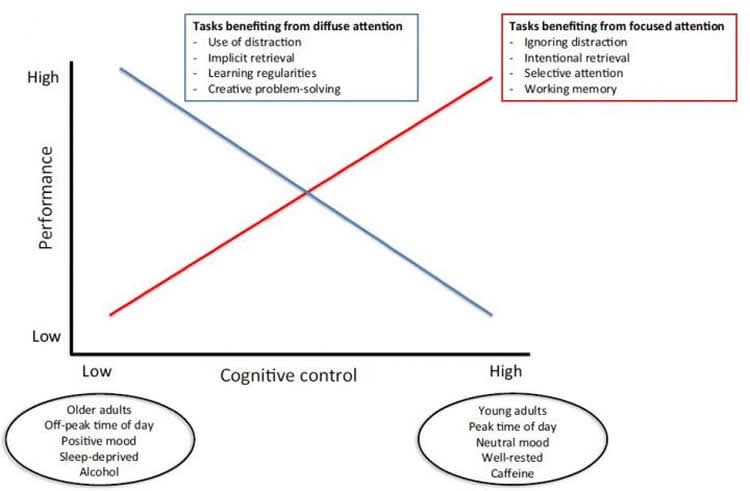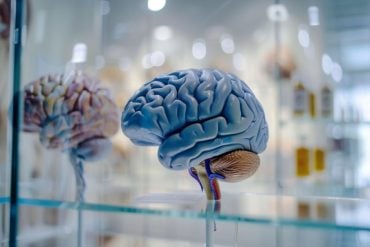Summary: According to researchers, for the aging brain, distractions and reduced focus may not be as bad as we think.
Source: Cell Press.
As you age, you may find it more difficult to focus on certain tasks. But while distractions can be frustrating, they may not be as bad as we think. In a review published November 15 in Trends in Cognitive Sciences, researchers at the University of Toronto and Harvard University suggest that there may be some benefits to reduced focus, especially in people over 50. Using behavioral studies and neuroimaging evidence, the researchers discuss how being easily distracted can help adults with, for example, problem solving and learning new information.
“Different types of tasks benefit from a more broad focus of attention, and this is usually seen in tasks that involve thinking creatively or using information that was previously irrelevant,” says first author Tarek Amer, a psychology Ph.D. candidate at the University of Toronto and a graduate student at the Rotman Research Institute. “The literature gives us the impression that older adults are essentially doomed as their cognitive abilities decrease, when, in reality, many older adults get along just fine in their day-to-day lives, and we think that shows that aging adults don’t always need to have high cognitive control.”
When people have high cognitive control, they are able to maintain their focused attention and ignore distractions to get things done. But Amer and his colleagues found that people with reduced cognitive control had an easier time thinking of creative solutions to problems, and they were better at noticing patterns in the world around them. These findings also indicated that older adults could outperform their younger counterparts on certain problem-solving tasks, as they were able to broaden their attention more easily. Additionally, people didn’t require high levels of cognitive control for inherent, day-to-day tasks, like walking down the street or learning new information.
In order to explore the benefits of cognitive control, many lab-based behavioral experiments require participants to complete a specific set of tasks, limiting the role of distraction. But the researchers say these experiments have shortcomings, as they don’t explore situations when distractions and reduced cognitive control could be helpful, making the conclusions fairly one sided.
“Many of the tasks that we study in classic cognitive psychology are tasks that require high cognitive control, but these assigned tasks might not accurately mirror what people do in the real world because they limit distractions,” says co-author Lynn Hasher, a professor of psychology at the University of Toronto and the Rotman Research Institute. “But a distraction in one setting can actually be useful information in another setting, and the more information you have, the better able you’re going to be to address a current problem.”

Amer and his colleagues hope to use this information to determine exactly what tasks can benefit from reduced control in order to better simulate these experiences in a lab. Although they also hope to expand the research beyond the aging population to examine how distractions can be beneficial for people with a range of cognitive impairments, for now they recognize that this understanding of cognitive control is a step closer to understanding the aging brain.
“There is a question about what really sustains performance in old age, and it’s clear that working memory alone cannot provide us with the answer to that question,” says Hasher. “But we think it’s possible that studying reduced cognitive control can help us understand how older adults can still perform independently and successfully in their lives.”
Funding: This work is supported by the Natural Sciences and Engineering Research Council of Canada through the Department of Psychology at the University of Toronto, the Rotman Research Institute, and the Department of Psychology at Harvard University.
Source: Michaela Kane – Cell Press
Image Source: This NeuroscienceNews.com image is credited to Amer, Campbell, Hasher/Trends in Cognitive Sciences 2016.
Original Research: Full open access research for “Cognitive Control as a Double-Edged Sword” by Tarek Amer, Karen L. Campbell, and Lynn Hasher in Trends in Cognitive Sciences. Published online November 15 2016 doi:10.1016/j.tics.2016.10.002
[cbtabs][cbtab title=”MLA”]Cell Press. “The Aging Brain Benefits From Distraction.” NeuroscienceNews. NeuroscienceNews, 15 November 2016.
<https://neurosciencenews.com/distraction-brain-aging-5515/>.[/cbtab][cbtab title=”APA”]Cell Press. (2016, November 15). The Aging Brain Benefits From Distraction. NeuroscienceNews. Retrieved November 15, 2016 from https://neurosciencenews.com/distraction-brain-aging-5515/[/cbtab][cbtab title=”Chicago”]Cell Press. “The Aging Brain Benefits From Distraction.” https://neurosciencenews.com/distraction-brain-aging-5515/ (accessed November 15, 2016).[/cbtab][/cbtabs]
Abstract
Cognitive Control as a Double-Edged Sword
Cognitive control, the ability to limit attention to goal-relevant information, aids performance on a wide range of laboratory tasks. However, there are many day-to-day functions which require little to no control and others which even benefit from reduced control. We review behavioral and neuroimaging evidence demonstrating that reduced control can enhance the performance of both older and, under some circumstances, younger adults. Using healthy aging as a model, we demonstrate that decreased cognitive control benefits performance on tasks ranging from acquiring and using environmental information to generating creative solutions to problems. Cognitive control is thus a double-edged sword – aiding performance on some tasks when fully engaged, and many others when less engaged.
Trends
The ability to selectively focus attention and inhibit distraction (i.e., cognitive control) contributes to a broad set of cognitive functions aiding performance on explicit, goal-driven tasks.
Recent developments have shown that a broader focus of attention, afforded by reduced control, is more beneficial in some learning, memory, and problem-solving contexts which depend on extracting and utilizing information from a variety of sources.
In older adults, reduced control appears to provide advantages on some tasks, such as using previously acquired environmental information, learning regularities, and creative problem solving.
This processing style allows older and, under some circumstances, younger adults to handle many challenges encountered in everyday life, and possibly contributes to the high functioning of many older adults outside the lab.
“Cognitive Control as a Double-Edged Sword” by Tarek Amer, Karen L. Campbell, and Lynn Hasher in Trends in Cognitive Sciences. Published online November 15 2016 doi:10.1016/j.tics.2016.10.002






